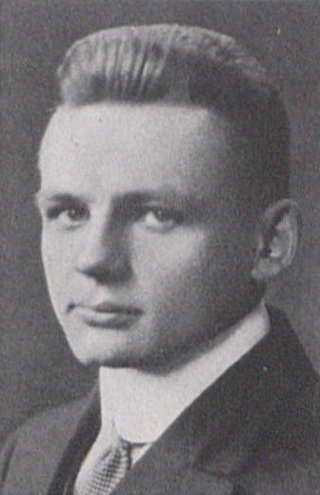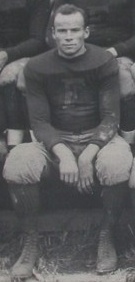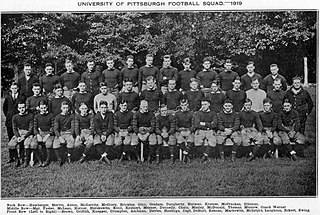Related Research Articles

George Washington F. Orton was a Canadian middle and long-distance runner. In 1900, he became the first Canadian to win a medal at an Olympic Games. He won a bronze in the 400 metre hurdles, and then, forty-five minutes later, won the gold medal in the 2500 metre steeplechase. He was the first athlete with a disability to win an Olympic gold medal. At the University of Pennsylvania, for whom he competed while earning his Masters and Doctorate and completed his ability to speak 9 languages, he was captain of Penn's track and field team in 1896 and was a founder and captain of its ice hockey team in 1896-1897, and was known as "The Father of Philadelphia Hockey". He won seventeen U.S. National Track and Field titles.

The Penn Quakers men's basketball team is the college basketball program representing the University of Pennsylvania. As the twentieth-winningest men's basketball program of all-time, the team from Penn had its greatest success from 1966 to 2007, a period of over 40 years. Penn plays in the Ivy League in NCAA Division I.

Robert Norman "Punk" Berryman was an American football player and coach. He played as a halfback at Pennsylvania State University and was selected as third-team All-American in 1915, his senior year. Berryman served as the head football coach at Gettysburg College in 1916 and at Lafayette College in 1917. He was subsequently an assistant football coach at the University of Iowa and Dickinson College. Berryman served as the head basketball coach at Iowa State University during the 1919–20 season; his team finished the season with an overall record of 6–12, placing seventh in the Missouri Valley Intercollegiate Athletic Association with a conference mark of 2–10. In 1922 and 1923 Berryman was an assistant coach at Colgate University under fellow Penn State alumnus, Dick Harlow. In 1924, he coached the Frankford Yellow Jackets, newly enfranchised to the National Football League (NFL), to a record of 11–2–1, good enough for only a third-place finish. The following season, Berryman coached the Millville Football & Athletic Club. In 1926, he coached the Brooklyn Lions to a record of 3–8 in their only season with the NFL. Berryman was born on May 18, 1892. He attended the Northeast Manual Training School in Philadelphia. He died in May 1966.

James R. Ludlow "Lud" Wray was a professional American football player, coach, and co-founder, with college teammate Bert Bell, of the Philadelphia Eagles of the National Football League (NFL). He was the first coach of the Boston Braves and of the Eagles.
Education in Philadelphia, Pennsylvania has a rich and storied history. This history began with Benjamin Franklin's founding of the University of Pennsylvania as European styled school and America's first university. Today's Philadelphia region is home to nearly 300,000 college students, numerous private and parochial secondary schools, and the 8th largest school district in the country.

Thomas Truxtun Hare was an American Olympic medalist who competed in track and field and the hammer throw. He also played football with the University of Pennsylvania and was selected first-team All-American all four years. Sports Illustrated wrote, "Few early 20th Century players were as revered as Hare, who played every minute of every game." He was selected as a charter member of the College Football Hall of Fame in 1951.

Sol S. Metzger was an American football player, coach of football and basketball, college athletics administrator, and sports journalist. He served as the head football coach at Baylor University (1904), the University of Pennsylvania (1908), Oregon State University (1909), West Virginia University (1914–1915), Washington & Jefferson College (1916–1917), Union College (1919), the University of South Carolina (1920–1924). Metzger was also the head basketball coach at South Carolina for one season in 1920–21, tallying a mark of 7–11. In addition, Metzger wrote a nationally syndicated sports column.

Robert Cook Folwell Jr. was an American football player and coach. He served as the head coach at Lafayette College (1909–1911), Washington & Jefferson College (1912–1915), the University of Pennsylvania (1916–1919), and the United States Naval Academy (1920–1924), compiling a career college football record of 106–29–9. Folwell then moved to the professional ranks, coaching the New York Giants of the National Football League (NFL) in 1925, the Philadelphia Quakers of the American Football League in 1926, and the Atlantic City Roses of the Eastern League of Professional Football in 1927.

Benjamin Lee Boynton, a.k.a. "The Purple Streak", was a professional football player who played during the early years of the National Football League. He was elected to the College Football Hall of Fame in 1962. He played in the NFL for the Washington Senators, Rochester Jeffersons and Buffalo Bisons.

Charles Gelbert was an American football player, nicknamed "the Miracle Man" because he did so much with so little. He was a four-year starter for the Penn Quakers, from 1893 to 1896, and played guard and end. During his time at Penn, the school's football teams won consecutive national champions with undefeated seasons in 1894 and 1895. He also earned All-American honors from Walter Camp in 1894, 1895, and 1896. He was elected to the College Football Hall of Fame in 1960. In 1912, Jack Kofoed, writing in the Philadelphia Record, named Gelbert to his all-time All-America team.
Robert Watkins "Bert" Yeabsley was a professional baseball player. Yeabsley played in Major League Baseball for Philadelphia Phillies in the 1919 season. He only played in three games in his one-year major league career, not having an at bat in any of them.

Stanley Rankin Robb was an American football lineman and end who played one season in the National Football League (NFL) for the Canton Bulldogs. A native of Pittsburgh, Pennsylvania, he attended Peabody High School and Mercersburg Academy, after which he played college football for the Centre Praying Colonels (1920) and West Virginia Wesleyan Bobcats (1921). Robb began his professional football career in 1922, splitting the year between the Holmesburg Athletic Club and Philadelphia Quakers. He played the 1923 season with the Clifton Heights Orange & Black before joining the Pottsville Maroons for their Anthracite League championship year in 1924. Robb joined the Canton Bulldogs, coached by his brother Harry, in 1926, playing what would be his only three games in the NFL while scoring one touchdown. He later returned to Clifton Heights to finish his career.

Albert Hayes Sharpe was an All-American football player, coach and athletic director and medical doctor. He played football for Yale University and was selected as a halfback for the 1899 College Football All-America Team. Sharpe was also a star basketball player in the early years of the college game. Sharpe also excelled in baseball, gymnastics, rowing and track. In 1915, Sharpe was selected by one sporting expert as the greatest living athlete in the United States. He later served as a coach and administrator at Cornell University, Yale, the Ithaca School of Physical Education and Washington University in St. Louis.

Henry John "Heinie" Miller was an American football player and coach from 1920 to 1942. He played in The National Football League (NFL) for the Buffalo All-Americans and the Milwaukee Badgers.
The Union Club of Phoenixville was a professional football team based in Phoenixville, Pennsylvania. The team was the result of a 1919 merger between the Phoenixville Union Club and the upstart Phoenix Athletic Club. From 1907 until 1919, the Union Club was considered one of the best football teams in eastern Pennsylvania. However, in 1919 the upstart Phoenix Athletic Club signed many of the top players of the area, leaving the Union Club no choice but to merge with the Phoenix A.C. The team is best known for defeating the Canton Bulldogs 13–7, in 1920. The team folded in 1921.
Joseph "Butch" Spagna was a professional football player during the 1920s.
The Union Quakers of Philadelphia were a professional independent football team, based in Philadelphia, Pennsylvania, in 1921. The team evolved from a number of pro players who played with the Union Club of Phoenixville during their 1920 season. During their only season of operation, the club won the "Philadelphia City Championship". All of the team's home games were played at the Baker Bowl.
Edward Joseph McNichol was the head men's basketball coach for the University of Pennsylvania from 1920 to 1930. His first Penn team finished the season with a 21–2 record and was retroactively named the national champion by the Helms Athletic Foundation. This was Penn's second consecutive Helms national championship, the previous year's 21–1 team having later been recognized as the Helms national champion as well.

The 1919 Pittsburgh Panthers football team was an American football team that represented the University of Pittsburgh as an independent during the 1919 college football season. In its fifth season under head coach Pop Warner, the team compiled a 6–2–1 record and outscored all opponents by a total of 119 to 66. The team played its home games at Forbes Field in Pittsburgh.
The 1919 Penn Quakers football team was an American football team that represented the University of Pennsylvania as an independent during the 1919 college football season. In their fourth season under head coach Bob Folwell, the Quakers compiled a 6–2–1 record, shut out five of nine opponents, and outscored all opponents by a total of 283 to 40. The team played its home games at Franklin Field in Philadelphia.